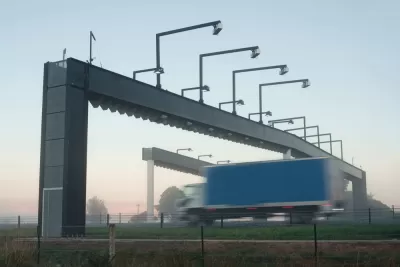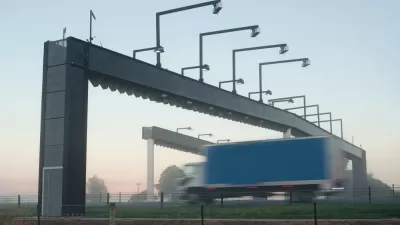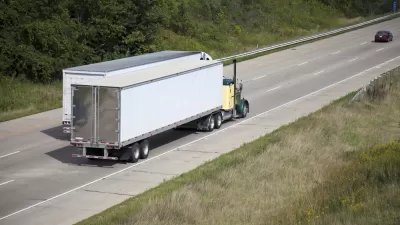After the Rhode Island General Assembly passed controversial legislation in February 2016 spearheaded by Gov. Gina Raimondo (D), the first two of what will be 13 truck-only toll gantries became operational on June 11. Results are looking good.

"Data from the second month of Rhode Island’s truck-tolling program indicates that the number of vehicles moving through the gantries is higher than projected, while the number of trucks diverting to alternate routes is far lower than expected," reports Eleanor Lamb for Transport Topics.
The Rhode Island Department of Transportation [RIDOT] released data Sept. 13 covering tolling transactions that occurred from July 11 to Aug. 10.
The state’s two truck tolls are over Interstate 95 and are located in Hopkinton and Exeter, both of which toe the state’s border with Connecticut. The Hopkinton toll is $3.25, and the Exeter toll is $3.50. The tolls are limited to one charge per facility, per day in each direction and do not exceed $40 per day.
Revenue used to repair bridges
As posted in May 2015, the nation's smallest (by area) state also holds the dubious title of having the highest percentage, 56%, of bridges rated deficient by federal standards according to 2014 data compiled by the Federal Highway Administration. "About 22% of the 1,162 bridges in Rhode Island are 'structurally deficient," according to RIDOT.
The tolls collected at each location will go to repair the bridge or bridge group associated with that toll location.
The full budget for RhodeWorks is about $4.9 billion over ten years and about one-tenth of that amount will come from the tolling program.
A RIDOT fact sheet [pdf] indicates that tolls will be collected electronically so trucks need not stop to pay along the six major highway corridors where the 12 or 13 gantries will be located:
Each gantry will be equipped with devices to read a truck’s transponder and deduct the toll. Trucks without a transponder will be billed by mail using a camera that records license plates.
Why truck-only tolls?
The Virginia Bicycle Federation reminded us in 2009 of the excessive road damage caused by heavy trucks in comparison to other vehicles. "According to a GAO study, "Excessive Truck Weight: An Expensive Burden We Can No Longer Afford," road damage from one 18-wheeler is equivalent to 9600 cars(p.23 of study, p.36 of PDF)." However, a May 2016 post, also based on a cycling organization's research, places the ratio at "410 average sized cars traveling on a road to equal the level of damage caused by one 18,000 pounds big rig truck. But it only takes 21 average cars to cause the level of damage created by a single hummer."
Joe Cortright of City Observatory reported (via Planetizen) on a March 2015 Congressional Budget Office study that looked at all the costs beyond road and bridge wear, such as crashes, pollution, and congestion. The "unpriced external cost are around eight times higher than rail," wrote David Austin, an analyst in CBO's Microeconomics Studies Division, and author of the CBO report.
While it is indisputable that heavy trucks cause disproportionate damage to roads and bridges, why is Rhode Island the only state to pursue a truck-only toll program? Trucks pay no extra fees to travel through Rhode Island, according to RIDOT, unlike other states, pointing to two examples:
- Trucks pay $182 on the Pennsylvania Turnpike
- Trucks pay $114 to cross the George Washington Bridge from New Jersey to New York
While a truck-only toll may make sense from a policy perspective, it is very challenging from a political perspective due to the power of the trucking industry, whose opposition to RhodeWorks dates back well before the General Assembly approved the authorizing legislation in February 2016.
Lawsuit filed
“Diversion, truck counts and toll revenue have absolutely nothing to do with the constitutionality of truck-only tolls,” Rhode Island Trucking Association President Chris Maxwell told Transport Topics. “Enjoy it while it lasts!”
American Trucking Associations, Cumberland Farms Inc., M&M Transport Services Inc. and New England Motor Freight filed a lawsuit July 10 contesting the constitutionality of the tolling program. The lawsuit maintains that truck tolls discriminate against interstate commerce.
RIDOT Director Peter Alviti filed a motion Aug. 24 in the U.S. District Court of Rhode Island to dismiss the lawsuit.
After the authorizing legislation passed in February 2016, the program still needed to receive approval from the Federal Highway Administration, which it did in October 2016.
Political price?
It would seem that there might be a political price to be paid for approving the controversial program, and it would seem that the most likely politician to be targeted would be Gov. Gina Raimondo, the Ocean State's first female governor who took office in 2015, and who Lamb calls the program's creator. The program is fiercely opposed by the state GOP.
Lamb reported Sept. 13 that Raimondo won the Democratic primary and will face her 2014 Republican opponent, Allan Fung, mayor of Cranston, the state's third largest city, since 2009, and a staunch opponent of the truck-only tolls. It will be their second meeting – Raimondo edged-out Fung in 2014 by 3 percent. She leads him by two percent in a poll cited by Lamb.
Why not raise the fuel tax and have all road users pay for road and bridge repair?
Actually, the gas tax was hiked to pay for road and bridge repair. But recent history shows how much tolls are despised by politicians; tolls that are paid by motorists, not heavy truck drivers, that is.
The Ocean State was one of six state gas taxes that increased on July 1, 2015, under a law signed by former Gov. Lincoln Chafee in 2014. Interestingly, the gas tax increase of one cent, technically an inflation adjustment, was viewed as a means "to avert the much-despised toll on the new Sakonnet River Bridge" which opened in September 2012, reported Katherine Gregg on May 27, 2015, for the Providence Journal.
In lieu of a single toll on a single bridge, lawmakers raised fees and taxes to create a new Transportation Infrastructure Fund designed to increase the amount of money available for road and bridge reconstruction and repairs from $12 million in the current budget year to $184 million in the year that begins July 1, 2018.
The state gas tax of 34 cents per gallon is now indexed to inflation. Average state gas taxes, according to the American Petroleum Institute, are 34.09 cents per gallon.
What to watch for:
- The outcome of the gubernatorial race on Nov. 6 between Gov. Raimondo (D), RhodeWorks creator, and RhodeWorks opponent, Allan Fung (R), on Nov. 6. In an indirect way, the election may be viewed as a referendum on RhodeWorks and the influence of the trucking lobby.
- The outcome of the American Trucking Associations, et.al. v. Peter Alviti, Jr., Director of the Rhode Island Department of Transportation [pdf].
For more articles on RhodeWorks, click on Transport Topic's tag, Rhode Island toll.
Related posts in Planetizen:
FULL STORY: Second Month of R.I. Truck Tolls Exceeds Expectations

Planetizen Federal Action Tracker
A weekly monitor of how Trump’s orders and actions are impacting planners and planning in America.

Chicago’s Ghost Rails
Just beneath the surface of the modern city lie the remnants of its expansive early 20th-century streetcar system.

San Antonio and Austin are Fusing Into one Massive Megaregion
The region spanning the two central Texas cities is growing fast, posing challenges for local infrastructure and water supplies.

Since Zion's Shuttles Went Electric “The Smog is Gone”
Visitors to Zion National Park can enjoy the canyon via the nation’s first fully electric park shuttle system.

Trump Distributing DOT Safety Funds at 1/10 Rate of Biden
Funds for Safe Streets and other transportation safety and equity programs are being held up by administrative reviews and conflicts with the Trump administration’s priorities.

German Cities Subsidize Taxis for Women Amid Wave of Violence
Free or low-cost taxi rides can help women navigate cities more safely, but critics say the programs don't address the root causes of violence against women.
Urban Design for Planners 1: Software Tools
This six-course series explores essential urban design concepts using open source software and equips planners with the tools they need to participate fully in the urban design process.
Planning for Universal Design
Learn the tools for implementing Universal Design in planning regulations.
planning NEXT
Appalachian Highlands Housing Partners
Mpact (founded as Rail~Volution)
City of Camden Redevelopment Agency
City of Astoria
City of Portland
City of Laramie





























